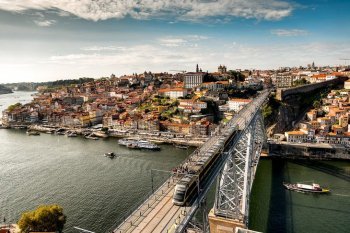European study shows Porto's strategic alignment with the Sustainable Development Goals

15 Oct 2021
Porto is part of a group of six pilot cities analyzed in the study "Building urban datasets for the SDGs. Six pilot European cities monitoring the 2030 Agenda”. Prepared by the European Commission’s Joint Research Center, the work involved the identification and collection of performance indicators of the city, in order to assess the degree of compliance to the targets of the 17 Sustainable Development Goals (SDGs) decreed by the United Nations. The results were presented during the European Week of Regions and Cities 2021.
Most of the measures implemented by the city are based on the objective "Sustainable Cities and Communities", followed by "No Poverty", "Clean Water and Sanitation", and "Responsible Consumption and Production ".
The study highlights the fact that "along with the focus on the local identity", Porto has developed research, entrepreneurship and innovation. The city "is committed to becoming more innovative and resilient" supporting "new businesses and promoting spaces where ideas can be shared”, he says, referring to the "innovation ecosystem” created by Porto Innovation Hub, and the distinction with the "Smart City Innovator Award”.
Most of the measures implemented by the city are based on the objective "Sustainable Cities and Communities", followed by "No Poverty", "Clean Water and Sanitation", and "Responsible Consumption and Production ".
The study highlights the fact that "along with the focus on the local identity", Porto has developed research, entrepreneurship and innovation. The city "is committed to becoming more innovative and resilient" supporting "new businesses and promoting spaces where ideas can be shared”, he says, referring to the "innovation ecosystem” created by Porto Innovation Hub, and the distinction with the "Smart City Innovator Award”.
The field of mobility is presented as one of the challenges faced by the city in the pursuit of the 2030 Agenda. To respond to the large number of people who travel to Porto every day, the Municipality "has been developing solutions that favor smooth mobility, improve the supply and quality of public transport and promote intermodal mobility”.
Some of the indicators of the city's commitment to reduce its ecological footprint were the signing of the Covenant of Mayors for Climate and Energy, but also the compromise to reduce CO2 emissions by 50% until 2030.
Initiatives such as "Escola Solidária” [Solidarity School], Sistema de Monitorização do Estado Nutricional Infantil e de Atividade Física [Monitoring System for the Nutritional Status of Children and Physical Activity] for children from the 1st cycle of Basic Education, attention to food waste, the "Embrulha" project, or the collection of organic waste are mentioned as examples of what the city is doing to achieve the SDG targets.
Maintain competitiveness based on sustainable measures.
From the analysis arises the certainty that "in the coming years, it will be important that Porto maintains its competitiveness at a national, European and international level, sustaining the pace of economic and social growth, and adopting sustainable development measures that work in harmony with the identified challenges”, whether concerning mobility, housing or the aging of the population.
The European Commission's Joint Research Center report praises the fact that Porto is preparing its first Local Voluntary Report, recommended by the UN, a document that identifies the most transformative actions implemented in the city, the ambition and achievement of goals, the main challenges, gaps and critical success factors, thus allowing policy choices which are better suited to reality.
The study highlights ongoing processes of information concentration such as observatories in the areas of cohesion and social housing, as well as Porto’s Portal de Dados Abertos [Open Data Portal], a collaborative interface between the City Council, citizens, companies and other institutions that "will support decision-making" and "outline well-informed policies and strategies."
One last point that the work could not run away from relates to the response to the Covid-19 pandemic. In this field, the example of Porto is given, among other initiatives, with the reference to the Data4COVID19 or "Shop in Porto" projects.
"Over the last few years, Porto has been visibly involving itself in this process and acted in order to meet the goals of sustainable development. This is illustrated by the Plano Diretor Municipal [Municipal Master Plan], which establishes the city's seven main strategies and respective guidelines", as can be read in the document.
In addition to Porto, whose participation was the responsibility of Maria Oliveira Pacheco, from the University of Porto, the Spanish cities of Seville and Valencia, Bratislava, in Slovakia, the Italian community Régio da Emília, and the Finnish cities Oulu and Turku were also analysed.
Initiatives such as "Escola Solidária” [Solidarity School], Sistema de Monitorização do Estado Nutricional Infantil e de Atividade Física [Monitoring System for the Nutritional Status of Children and Physical Activity] for children from the 1st cycle of Basic Education, attention to food waste, the "Embrulha" project, or the collection of organic waste are mentioned as examples of what the city is doing to achieve the SDG targets.
Maintain competitiveness based on sustainable measures.
From the analysis arises the certainty that "in the coming years, it will be important that Porto maintains its competitiveness at a national, European and international level, sustaining the pace of economic and social growth, and adopting sustainable development measures that work in harmony with the identified challenges”, whether concerning mobility, housing or the aging of the population.
The European Commission's Joint Research Center report praises the fact that Porto is preparing its first Local Voluntary Report, recommended by the UN, a document that identifies the most transformative actions implemented in the city, the ambition and achievement of goals, the main challenges, gaps and critical success factors, thus allowing policy choices which are better suited to reality.
The study highlights ongoing processes of information concentration such as observatories in the areas of cohesion and social housing, as well as Porto’s Portal de Dados Abertos [Open Data Portal], a collaborative interface between the City Council, citizens, companies and other institutions that "will support decision-making" and "outline well-informed policies and strategies."
One last point that the work could not run away from relates to the response to the Covid-19 pandemic. In this field, the example of Porto is given, among other initiatives, with the reference to the Data4COVID19 or "Shop in Porto" projects.
"Over the last few years, Porto has been visibly involving itself in this process and acted in order to meet the goals of sustainable development. This is illustrated by the Plano Diretor Municipal [Municipal Master Plan], which establishes the city's seven main strategies and respective guidelines", as can be read in the document.
In addition to Porto, whose participation was the responsibility of Maria Oliveira Pacheco, from the University of Porto, the Spanish cities of Seville and Valencia, Bratislava, in Slovakia, the Italian community Régio da Emília, and the Finnish cities Oulu and Turku were also analysed.




